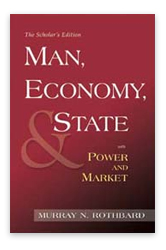 Everyone should have a basic understanding of economics – it is the most vital school of social theory. Those ignorant of economic principle are easily duped and manipulated by politicians and demagogues (or do I repeat myself?)
Everyone should have a basic understanding of economics – it is the most vital school of social theory. Those ignorant of economic principle are easily duped and manipulated by politicians and demagogues (or do I repeat myself?)
As an MBA, I have several years of economics in my educational background. It was a topic of interest for me in the early years. We started with “micro” economics, learning the basic principles of supply and demand – not bad stuff. But after a cursory study of these principles, we quickly moved into “macro” economics. At this point, the study became much more abstract and mathematical. I remember sitting by a pool in Memphis, studying my econ text, trying dutifully to understand exactly how government deficit spending benefited the economy. I never did get it.
It turns out, there was a reason I never got it – it’s all crap.
If there was one good thing I learned from graduate school, it was that I had a lot to learn after finishing it. As Dr. Deming said, business schools do not teach proper theory, they teach the status quo – they teach the perpetuation of our decline.
See, it turns out that there are two major schools of economics – free market (Austrian) economics, and socialist (Keynesian) economics. If I had to sum them up for you in brief, it would go like this:
In the early years of economic thought, governments and economists were always at odds. Economists told governments no all to often; no, taxes are bad. No, deficit spending is bad. No, debt is not good for the economy. No, central banking is not a good idea. No, central planning does not work… Along came John Maynard Keynes, and suddenly governments not only no longer shunned economists, they hired and subsidized hordes of them. These economists advised that taxes were good, deficit spending stimulates the economy, central banking smooths the problems inherent in free markets, and central economic planning is valid and necessary.
It is important to understand that Keynesian economics did not displace the classical, Austrian school of economics by disproving anything the classical school held – it simply moved into a position of style and acceptance. When academics receive funding from government, it is beneficial to promote the school that the government wishes to advance.
One of the great failures of the Keynesian paradigm is in its view of the business cycle. We all hear about economic booms and busts (aka recessions, depressions, slowdowns, etc.) In Keynesian theory, booms and busts are inherent flaws in the market, and government economists, bankers, and central planners all have a role in smoothing the business cycle to protect us from the “excesses” of the free market.
Interestingly enough, the business cycle is created by central economic planning, manipulation of the money supply, and government spending. It all started to turn around when the Keynesians could not explain stagflation, a concurrent rise in unemployment and price inflation. Austrian Business Cycle Theory was able to provide a clear explanation – it all had to do with manipulation of, and intervention in the market by government. Yes, there is variation in a free market economy. Sometimes things are up, sometimes they are down. But the variation tends to be more local, more industry specific, while the economy as a whole maintains relative stability. Only through government manipulation (via central banking, primarily) does an entire economy make mass movements from boom to bust.
A core tenet of the American System, as established, is that central planning does not work. Free people engaging in voluntary exchange create markets and build wealth. Those who would seek government positions do not believe in free markets, they believe in central planning and control. It is only natural that they would support an anti-free market, pro-government school of economics. It is time that we reject socialist economics and all of its falsehoods, and educate ourselves on the virtues of economic freedom.
If you find yourself – or have found yourself – wanting to understand economics, and especially if you were turned off to the study from what you read, I recommend that you immerse yourself in the Austrian school. It’s non-mathematical and intuitive. You can get a ton of free media at the Mises Institute web site.